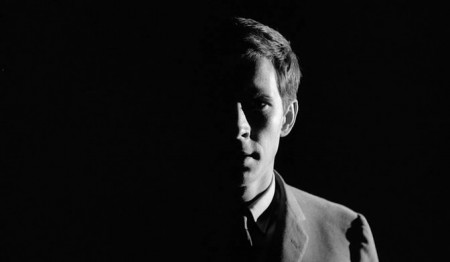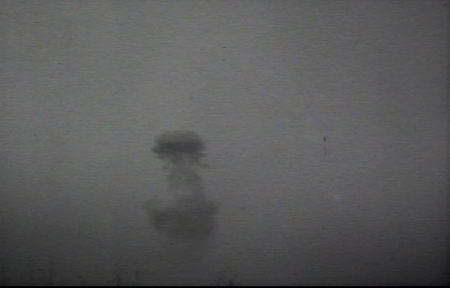Strange Moments in Solid Movies: The Trial By Atomic Bomb
Orson Welles’ The Trial is one of the great cinematic examples of style over substance, a work whose striking aesthetic overshadows many narrative considerations for the viewing audience. Although such a description is typically applied detrimentally, this film’s particular want of substance is precisely modulated. An adaptation of Franz Kafka’s novel, The Trial exhibits the logic of dreams/nightmares more than the logical mechanics of traditional storytelling; so what is shown will inherently trump anything that is explained (or explainable). In turn, navigating its dilapidated world of unusual (camera) angles, ominous surroundings, and haunting silhouettes, the audience yearns for clarity, just like protagonist Joseph K (Anthony Perkins) does. And just as The Trial is not a conventional story, the story contains no conventional trial, wherein an actualized attainability of justice is unworkable and idealistic notions like “nothing but the truth” are broken down to nothingness.
The plot details are decidedly sketchy. Waking up one morning, bureaucrat Joseph K finds police officers and his informing co-workers snooping around his lodge, going through his belongings. In a roundabout way (a “foolish babbling” that will hilariously continue throughout the film), he is told that he has been accused of committing a crime. Exactly what he’s charged for or what he’s even done is never divulged–nor does Joseph K think he has done anything wrong, and he surmises it could be an “abstract arrest”–but he nevertheless feels the pangs of guilt despite his stanch claim of innocence. The absurdity of his predicament motivates him to seek out answers. He needs to know what’s happening and he refuses to stand idly by, waiting for others to decide what to do with him, if anything.
Moreover, because he has a unique expression on his face (with lines near his mouth–perhaps the products of smiling in the gloom, speaking through the silence), others in his society think he looks guilty, which makes him unequivocally guilty. Joseph K’s appearance, whether it is conscious or not, separates him from the masses; he is different as he moves through the hustle and bustle of his workplace, stampeded by faceless employees, and the cluttered court system, overflowing with official documents and enigmatic administrators. And as the accused, Joseph K is singled out, outside everyone else who remains blameless; he is attractive to the expressionless. Women of all ages lust after him, finding his bad boy aura to be an aphrodisiac (which culminates in a riotous sequence that is no doubt a precursor to Beatlemania); men of all professions view him with fixated suspicion.
Whatever it is about him, one thing is clear: through his ordeals, Joseph K becomes more individualized (and, with it, possibly more of a criminal). Whether it is his position within his bureau or his journey through the labyrinthine power structure of the court and its officials, Joseph K is active and undaunted. When the powerful Advocate (Orson Welles) doesn’t give him the help he needs or the answers he’s looking for (other than offering a sentiment of complacency: “To be in chains is sometimes safer than to be free”), he dismisses him, opting instead to argue on his own behalf if a trial ever comes about. Likewise, when everyone else is going about business as usual, Joseph K acts for himself. He refuses to give in and grovel to anyone in a position of power. And, in a movie filled with bizarre developments, this refusal leads to the film’s strangest (spoiler-filled) moment that is also, strangely enough, it’s most profound: Joseph K’s death scene. Take a look:
To the very end, Joseph K does not resign himself to his sentence or any court-approved fate. Contorting his face with yells and lining his mouth with laughs, he denies the men the satisfaction of committing suicide, taking the power away from them. If he must die, then his silent and indistinguishable executioners will have to do their job; they will have to dirty their own hands. And indeed they do, but instead of using the knife, one throws dynamite, which is quickly snatched up by Joseph K and explodes before he can do anything more with it (if anything more could be done, anyway). But the explosion is immense, much more powerful than typical nitroglycerin. As the smoke and discharge rises higher into the air, it takes the shape of a mushroom cloud; the bomb was nuclear and the desolate skyline blooms with destructive atomic energy.
In an already unsettling movie, this slight-of-hands trick–something that Welles was certainly no stranger to–outdoes all the rest; the overwhelming blast comes out of nowhere, and, as severe as it is, its thematic significance barely registers (in keeping with the film’s consistent nightmarish logic). Because of this, it’s a wonderfully sly conceit (and a fascinating deviation from the source material). By forcing the men to kill him with the bomb–essentially going off script from Kafka’s story and from the court-sanctioned first option of death by self-inflicted knife wound–Joseph K has maintained a sense of personal agency that, though it may go with him to the grave, also lingers on like the final image of the mushroom cloud, towering over the city. He has remained unchained, and that has simultaneously caused a chain reaction.
There is nothing more atomic than the individual to society. The individual citizen is society’s fundamental building block and when that singular entity becomes dismantled–split like nuclear fission itself–the fallout is cumulatively devastating. And that is what appears to have happened in the world of The Trial. With the bomb’s burst comes the annihilation of the individual spirit, and those who scurry away from it fall back into the bosom of the degenerated conformity, perpetually perverse without the blasted accused, that is so pervasive and horrific in the film. Stomping out the accused has contaminated everything: the decaying city shifts and crumbles from explosions outside its limits; its architectural facades and citizen’s faces wear thin (to the point of facelessness) from the fallout. Continually taking the different to the edge of town leaves its mark. It’s self-defeating, signalling a continually grotesque society that treats its attractive in such a way. Even with all the bureaucratic litter and declarations of law and order, this world is colossally deficient, and its people are indeed “dummies”, lifeless and dumb inhabitants who do what they are told because they are not one of the tellers–that is, if there is even a teller at all beyond the almighty parabolist Orson Welles.





